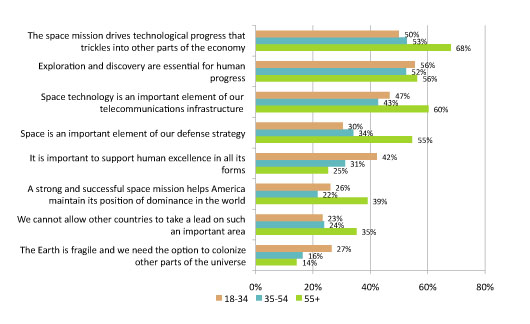January 10, 2014
Space Exploration: The Great Uniter
Posted by Nick Saab
As we jump headfirst into 2014, it seems as if both Americans and their elected officials in Congress couldn’t be more divided. 2013 won the prize for most unproductive year of Congress in the past three decades, enacting only 66 new laws. This is to say nothing of the avoidable government shutdown in October and the disastrous cuts of the sequester. It seems as if there is very little, if anything, Congress can find consensus on. Public political polarization as reflected in the halls of Congress is currently situated at an all-time high. Going forward into the new year, is there anything left we can agree on?
The answer is an unequivocal “yes”. Since its inception, the U.S. space program has elicited wonder, awe, and pride in the eyes of many. A new survey by YouGov of American attitudes towards NASA and overall space exploration shows just how much of a consensus exists on the issue. When asked to gauge the importance of maintaining NASA and the U.S. space program, a whopping 80 percent of respondents thought it important, with 27 percent and 25 percent saying it was “extremely important” or “very important” respectively. What’s more, this level of support is consistent across every single demographic they measured.
Drilling down further into the data, it becomes clear that the diversity of opinions as to the “why” differs based on age in interesting ways. Younger respondents’ (18-34) sentiment appears to be largely driven by a globally-conscious notion that human progress requires exploration. Additionally, the demographic also tends to view space exploration, more than the other two age groups, as a human endeavor rather than an explicitly national one. Unsurprisingly, the oldest demographic (55+), which lived through the Golden Era of NASA and human spaceflight has the highest selection rate for the reasons why support is critical.
One question which shows a high degree of variance based on demographic is the appropriate level of NASA funding. Overall, respondents largely believe that NASA funding is “about right” at 39 percent, with 25 percent believing NASA funding was “too low” and 9 percent answering that it was “much too low”. Factoring in education and income level, both of which are highly correlated, saw differing levels of support. 36 percent and 19 percent of individuals with a post graduate degree thought that funding levels were too low or much too low respectively, the highest support of any demographic. Meanwhile, those with an education level of “high school or less” held some of the highest percentage of belief that NASA was funded too much.
The take-away is that while we certainly have our work cut out for us, there are still many reasons to be hopeful. NASA and space exploration enjoys a level of support uncharacteristic of most other government agencies and programs. The job of scientists and advocates of science is to connect the dots between that level of support and the current inadequacies of funding realities. While funding has yet to be doled out by the House and Senate for FY14, in light of the recent budget negotiations, it’s expected that levels will remain once again at historic lows.
You can get involved at the front lines surrounding decisions that affect NASA and other science policy issues. Sign up today for our “Science is Essential” campaign, and you’ll receive an email which will allow you to choose your level of involvement.
– Nick Saab, AGU Public Affairs Specialist



